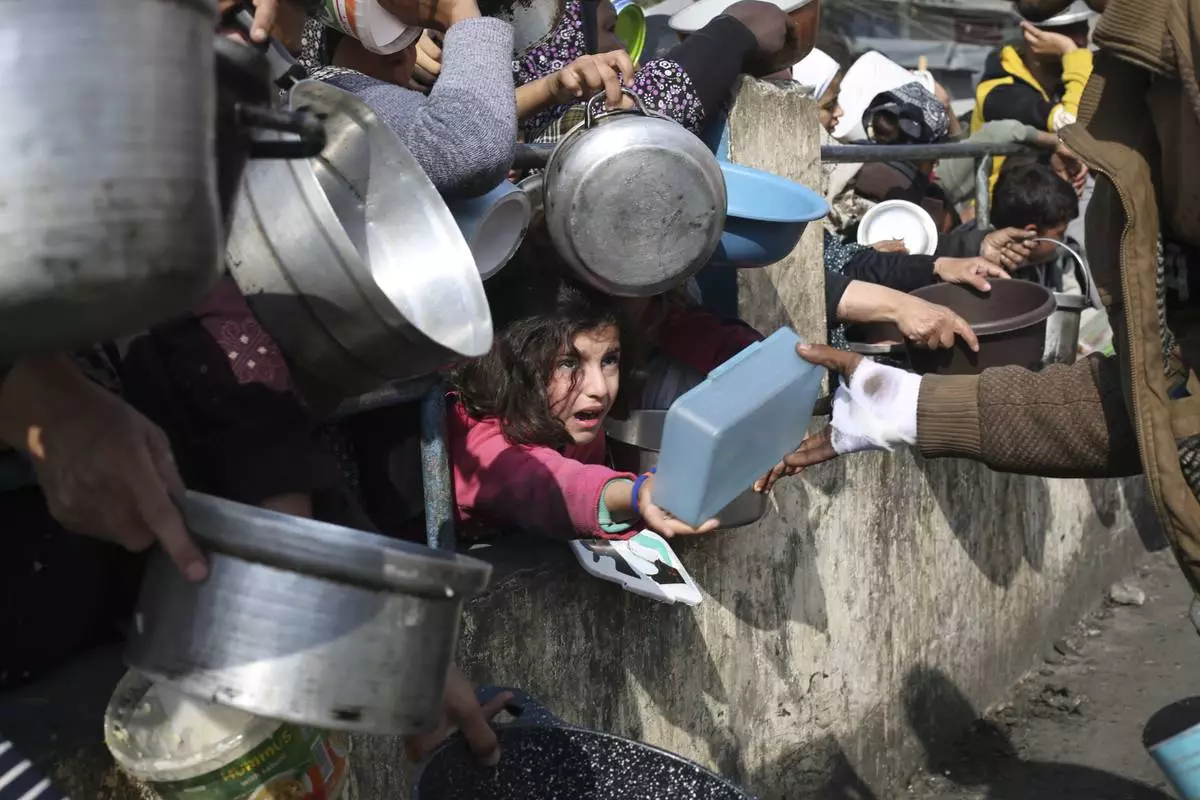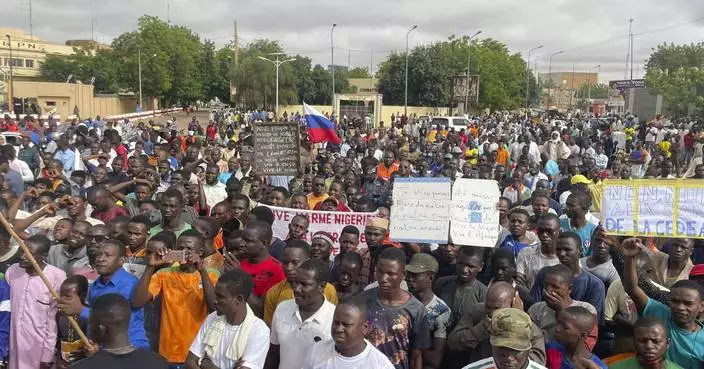The threat of nuclear missile attack by North Korea is accelerating, U.S. Defense Secretary Jim Mattis said Saturday, accusing the North of illegal and unnecessary missile and nuclear programs and pledging to repel any strike.
In remarks in Seoul with South Korean Defense Minister Song Young-moo at his side, Mattis said North Korea engages in "outlaw" behavior and that the U.S. will never accept a nuclear North.
The Pentagon chief added that regardless of what the North might try, it is overmatched by the firepower and cohesiveness of the decades-old U.S.-South Korean alliance.
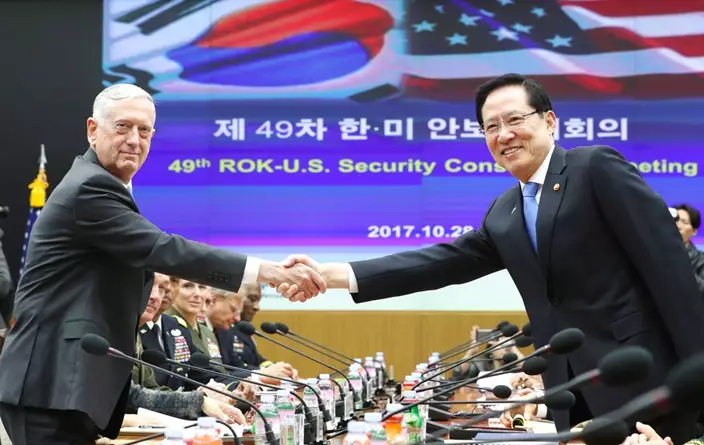
U.S. Defense Secretary Jim Mattis, left, and South Korean Defense Minister Song Young-moo shake hands while posing for a photo prior to the 49th Security Consultative Meeting (SCM) at Defense Ministry in Seoul, South Korea, Saturday, Oct. 28, 2017. (AP Photo/Lee Jin-man, Pool)
"North Korea has accelerated the threat that it poses to its neighbors and the world through its illegal and unnecessary missile and nuclear weapons programs," he said, adding that U.S.-South Korean military and diplomatic collaboration thus has taken on "a new urgency."
"I cannot imagine a condition under which the United States would accept North Korea as a nuclear power," Mattis said.
As he emphasized throughout his weeklong Asia trip, which included stops in Thailand and the Philippines, Mattis said diplomacy remains the preferred way to deal with the North.
"With that said," he added, "make no mistake — any attack on the United States or our allies will be defeated, and any use of nuclear weapons by the North will be met with a massive military response that is effective and overwhelming."
Mattis' comments did not go beyond his recent statements of concern about North Korea, although he appeared to inject a stronger note about the urgency of resolving the crisis.
While he accused the North of "outlaw" behavior, he did not mention that President Donald Trump has ratcheted up his own rhetoric. In August, Trump warned the North not to make any more threats against the United States, and said that if it did, it would be met with "fire and fury like the world has never seen."
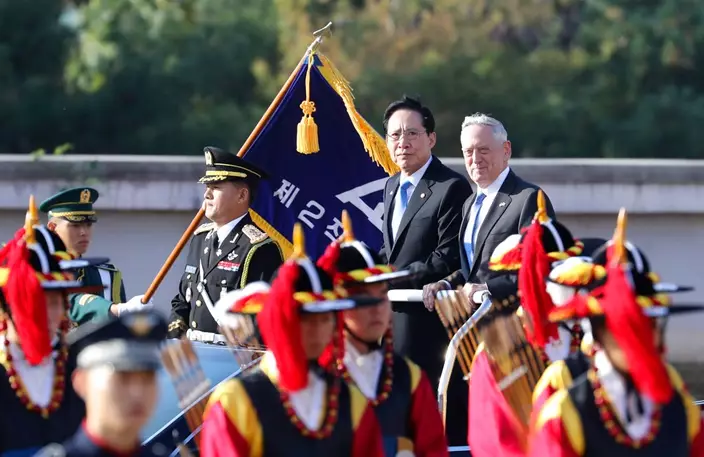
U.S. Defense Secretary Jim Mattis, rear right, and South Korean Defense Minister Song Young-moo inspect a guard of honor from a car during a welcome honor guard ceremony at Defense Ministry in Seoul, South Korea, Saturday, Oct. 28, 2017. Mattis said the threat of nuclear missile attack by North Korea is accelerating. (AP Photo/Lee Jin-man)
Song said at the news conference that he and Mattis agreed to further cooperation on strengthening Seoul's defense capabilities, including lifting warhead payload limits on South Korean conventional missiles and supporting the country's acquisition of "most advanced military assets." He offered no specifics and refused to answer when asked whether the discussions included nuclear-powered submarines.
Some South Korean government officials have endorsed the nation getting nuclear-powered submarines amid calls for more military strength. There's a growing concern among the South Korean public that North Korea's expanding nuclear weapons arsenal, which may soon include an intercontinental ballistic missile that could target the U.S. mainland, would undermine Seoul's long alliance with Washington.
South Korea's conservative politicians have also called for the United States to bring back tactical nuclear weapons that were withdrawn from the Korean Peninsula in the 1990s. But Mattis and Song were strongly dismissive of the idea.
"When considering national interest, it's much better not to deploy them," said Song, adding that the allies would have "sufficient means" to respond to a North Korean nuclear attack even without placing tactical nuclear weapons in the South. Mattis said current U.S. strategic assets are already providing nuclear deterrence and that the South Korean government has never approached him with the subject of tactical nuclear weapons.
Trump entered office declaring his commitment to solving the North Korea problem, asserting that he would succeed where his predecessors had failed. His administration has sought to increase pressure on Pyongyang through U.N. Security Council sanctions and other diplomatic efforts, but the North hasn't budged from its goal of building a full-fledged nuclear arsenal, including missiles capable of striking the U.S. mainland.
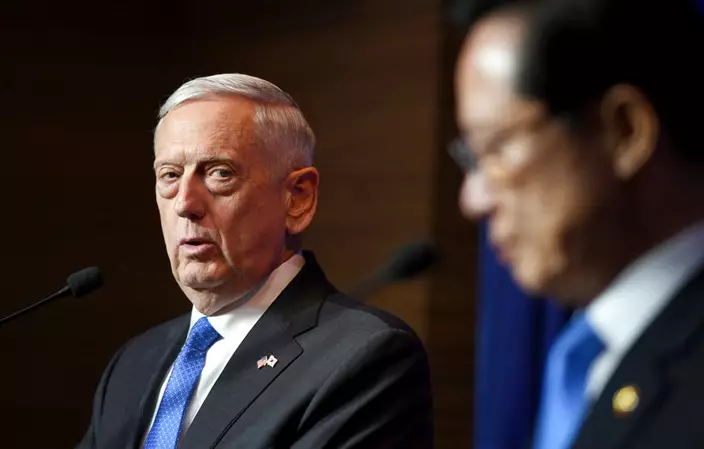
U.S. Secretary of Defense Jim Mattis, left, and South Korea's Defense Minister Song Young-moo hold a joint press conference after the Security Consultative Meeting (SCM) at the Defense Ministry, Saturday, Oct. 28, 2017, in Seoul, South Korea. During the briefing, Mattis says the threat of nuclear missile attack by North Korea is accelerating. (Jung Yeon-Je/Pool Photo via AP)
If Trump sticks to his pledge to stop the North from being able to threaten the U.S. with a nuclear attack, something will have to give — either a negotiated tempering of the North's ambitions or a U.S. acceptance of the North as a nuclear power.
The other alternative would be U.S. military action to attempt to neutralize or eliminate the North's nuclear assets - a move fraught with risk for South Korea, Japan and the United States.
Mattis touched off unease in South Korea last month when he told reporters at the Pentagon that the United States has military options for North Korea that doesn't put Seoul at risk. At Saturday's briefing, Mattis didn't offer a direct answer to what those options are or how and when they would be used.
"Our military options as I mentioned are designed to buttress the diplomats' efforts to maintain a deterrence stance and denuclearize the Korean Peninsula," he said. While the allies are committed to deterring North Korea, they also need "many different military options that would realistically reduce that threat as low as possible," Mattis said.
"And yes, we do have those options," he said.
The North says it needs nuclear weapons to counter what it believes is a U.S. effort to strangle its economy and overthrow the Kim government.
This was Mattis's second visit to South Korea since taking office in January. He made a point of going to Seoul and Tokyo on his first overseas trip in February, saying he wanted to emphasis the importance he places on strengthening alliances and partnerships.



